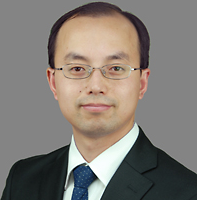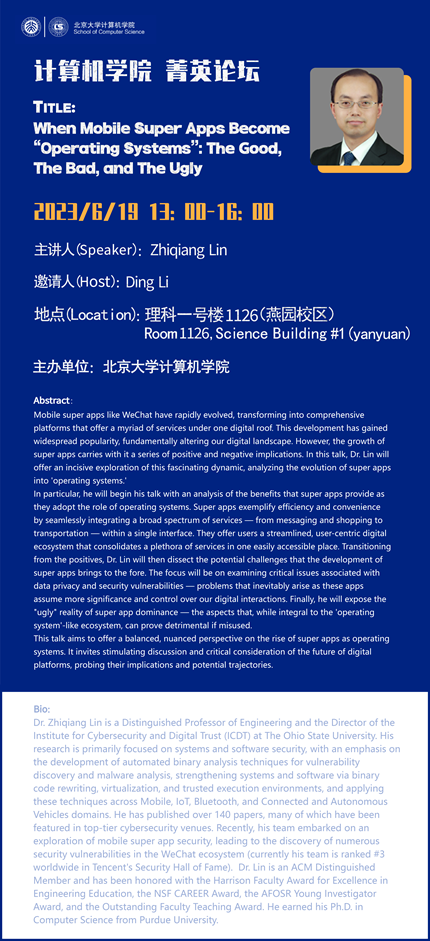计算机学院系列讲座菁英论坛第9期——When Mobile Super Apps Become “Operating Systems”: The Good, The Bad, and The Ugly
报告题目(Title):When Mobile Super Apps Become “Operating Systems”: The Good, The Bad, and The Ugly
时间(Date & Time):2023.6.19, 13-16pm
地点(Location):理科一号楼1126(燕园校区)
Room 1126, Science Building #1 (Yanyuan)
主讲人(Speaker):Zhiqiang Lin
邀请人(Host):Ding Li
报告摘要(Abstract):
Mobile super apps like WeChat have rapidly evolved, transforming into comprehensive platforms that offer a myriad of services under one digital roof. This development has gained widespread popularity, fundamentally altering our digital landscape. However, the growth of super apps carries with it a series of positive and negative implications. In this talk, Dr. Lin will offer an incisive exploration of this fascinating dynamic, analyzing the evolution of super apps into 'operating systems.'
In particular, he will begin his talk with an analysis of the benefits that super apps provide as they adopt the role of operating systems. Super apps exemplify efficiency and convenience by seamlessly integrating a broad spectrum of services — from messaging and shopping to transportation — within a single interface. They offer users a streamlined, user-centric digital ecosystem that consolidates a plethora of services in one easily accessible place. Transitioning from the positives, Dr. Lin will then dissect the potential challenges that the development of super apps brings to the fore. The focus will be on examining critical issues associated with data privacy and security vulnerabilities — problems that inevitably arise as these apps assume more significance and control over our digital interactions. Finally, he will expose the "ugly" reality of super app dominance — the aspects that, while integral to the 'operating system'-like ecosystem, can prove detrimental if misused.
This talk aims to offer a balanced, nuanced perspective on the rise of super apps as operating systems. It invites stimulating discussion and critical consideration of the future of digital platforms, probing their implications and potential trajectories.
主讲人简介(Bio):

Dr. Zhiqiang Lin is a Distinguished Professor of Engineering and the Director of the Institute for Cybersecurity and Digital Trust (ICDT) at The Ohio State University. His research is primarily focused on systems and software security, with an emphasis on the development of automated binary analysis techniques for vulnerability discovery and malware analysis, strengthening systems and software via binary code rewriting, virtualization, and trusted execution environments, and applying these techniques across Mobile, IoT, Bluetooth, and Connected and Autonomous Vehicles domains. He has published over 140 papers, many of which have been featured in top-tier cybersecurity venues. Recently, his team embarked on an exploration of mobile super app security, leading to the discovery of numerous security vulnerabilities in the WeChat ecosystem (currently his team is ranked #3 worldwide in Tencent's Security Hall of Fame). Dr. Lin is an ACM Distinguished Member and has been honored with the Harrison Faculty Award for Excellence in Engineering Education, the NSF CAREER Award, the AFOSR Young Investigator Award, and the Outstanding Faculty Teaching Award. He earned his Ph.D. in Computer Science from Purdue University.

